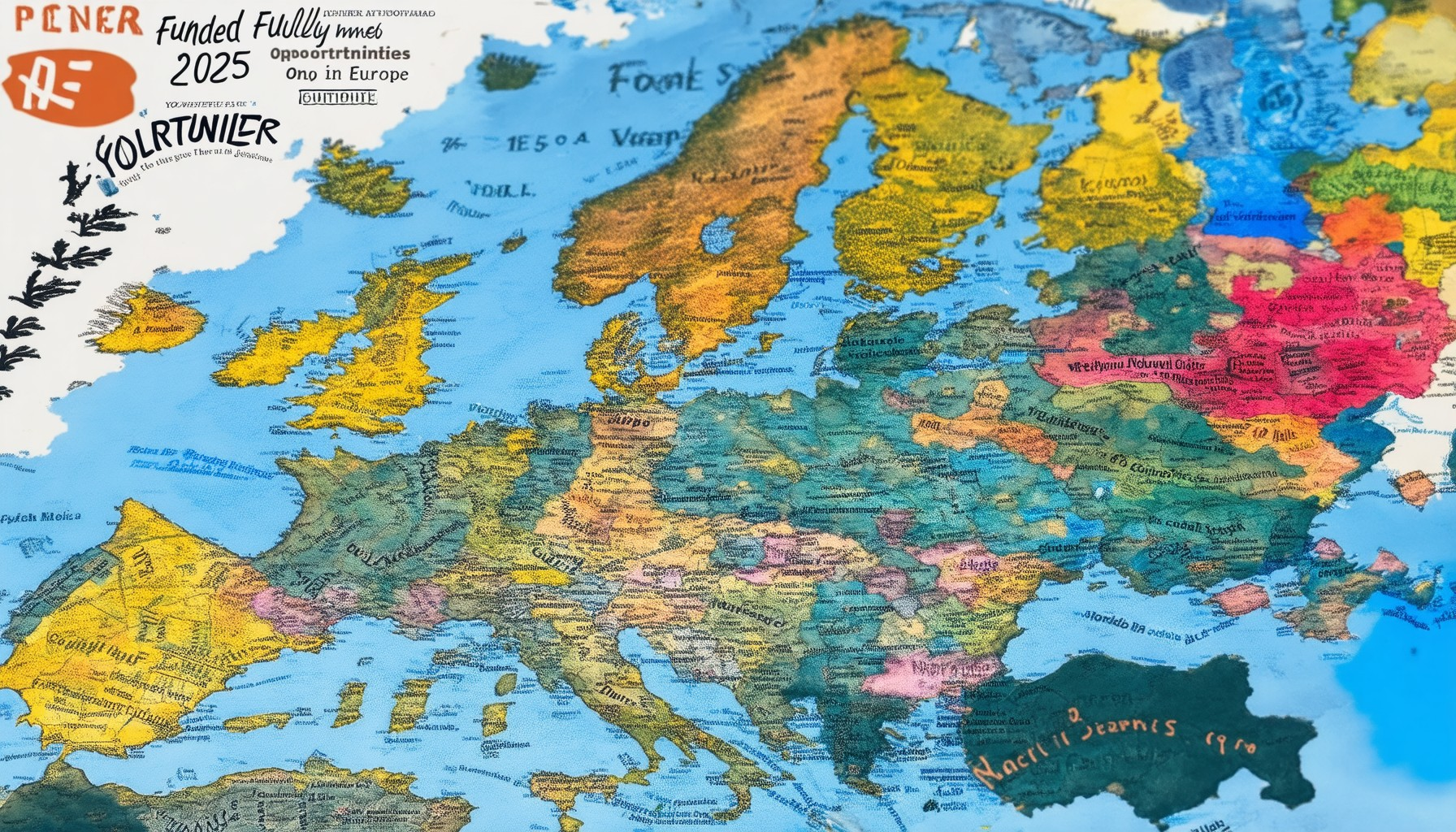Exploring volunteer opportunities in Europe has never been more appealing, particularly for those seeking meaningful experiences and cultural immersion. With the rise in demand for global volunteering, many individuals are now looking towards Europe as a prime destination to contribute their skills while gaining invaluable life experience. From fully funded programs to opportunities tailored for foreigners, Europe offers a diverse array of options that cater to various interests and backgrounds. Whether you’re a seasoned traveler or someone eager to embark on a new adventure, volunteering in Europe presents a unique chance to connect with communities, learn new languages, and grow personally while making a positive impact. This guide delves into the ins and outs of volunteering in Europe, including how to navigate the process, understand eligibility requirements, and discover the best-fit programs for your skills and aspirations.
Key Takeaways
– Top European Volunteering Program: The European Solidarity Corps (ESC) offers fully funded opportunities across Europe, lasting 6 to 12 months, covering accommodation, food, and travel.
– Age Limit Myths Debunked: You’re never too old to volunteer abroad—roles vary by age, with construction, education, and cultural exchange opportunities available to all ages.
– Flexible Commitment Options: Choose between short-term (weeks) or long-term (months) volunteer durations to suit your schedule and preferences.
– UN Volunteer Unique Status: As a UN Volunteer, you’re not traditionally employed but gain access to financial support, subsistence allowances, and other benefits to focus on your mission-driven work.
– Benefits Over Subsalary: Enjoy financial and subsistence allowances, healthcare, and social services in some host countries, while contributing meaningfully to global causes.

Can Americans Volunteer in Europe?
Americans have numerous opportunities to volunteer in Europe, offering a chance to gain international experience while contributing to meaningful causes. Here’s a breakdown of the primary ways Americans can volunteer in Europe:
- Work & Travel Programs
- Many European countries offer work-and-travel programs through organizations like Workaway or Cultural Exchange . These programs allow participants to work in exchange for accommodation and meals, providing a sustainable way to explore the region.
- Teaching English is a popular option in many European cities. Organizations like Teach Abroad connect English speakers with schools across Europe.
- NGO Volunteering
- Non-governmental organizations (NGOs) operate globally, and many have projects in Europe. Volunteering with NGOs often involves hands-on work in areas like environmental conservation, social justice, or education. Examples include Wereldorganisatie and Humane Society International .
- Local NGOs in European countries often seek international volunteers for specific projects. Platforms like Volunteer.com facilitate connections between volunteers and local organizations.
- Cultural Exchange Programs
- Language exchange platforms like Tandem and Intercaambios allow Americans to volunteer their time teaching languages to locals in exchange for accommodation and cultural experiences.
- Festivals and events in Europe often seek international volunteers. Opportunities range from assisting at music festivals to helping with local community events. Websites like Festivals and Events list volunteer positions.
- Short-Term Volunteer Projects
- Organizations like Giro Pacific offer short-term volunteer trips to Europe, focusing on projects like environmental conservation or community development.
- Many religious or cultural organizations arrange volunteer trips to Europe, often involving service work in orphanages, hospitals, or schools. Examples include YWAM and Catholic Charities USA .
To get started, consider visiting platforms like Volunteer Abroad or My Interac to find suitable programs. Research specific countries and organizations to align your skills and interests with their needs. Remember to prepare thoroughly before departing, including checking visa requirements and immunization guidelines.
Which Country Needs Volunteers the Most?
The demand for volunteers varies globally, with certain countries facing greater challenges in areas like healthcare, education, environmental conservation, and disaster recovery. Below is a breakdown of regions and countries that currently require volunteer support:
Asia
- Nepal : Known for its mountainous terrain and cultural heritage, Nepal often requires volunteers for healthcare, education, and tourism-related projects.
- India : India has numerous opportunities in healthcare, education, and urban development, particularly in rural areas.
Africa
- South Africa : Volunteering opportunities exist in healthcare, wildlife conservation, and community development.
- Namibia : Focuses on wildlife conservation and community-based projects, especially in rural areas.
Latin America
- Costa Rica : Offers opportunities in eco-tourism, healthcare, and community development projects.
- Peru : Requires volunteers for education, healthcare, and cultural preservation, particularly in remote areas.
Middle East and North Africa
- Jordan : Needs volunteers for healthcare, education, and community support, especially in underserved areas.
Volunteer Impact Factors
- Recent Disasters : Countries affected by natural disasters or conflicts may have increased needs for volunteers skilled in emergency response and reconstruction.
- Economic Challenges : Developing nations often face shortages of resources and skilled workers, making volunteer contributions invaluable.
Benefits for Volunteers
- Gaining hands-on experience in professional fields.
- Opportunity to live in a new culture and travel affordably.
- Contributing to meaningful global causes and making a positive impact.
For those interested in volunteering, it’s essential to research specific organizations and programs aligned with your skills and interests. Many volunteer agencies provide detailed information on how to get involved and the best ways to contribute effectively.

The European Equivalent of the Peace Corps
The European Solidarity Corps is the counterpart to the Peace Corps within the European Union. This initiative is designed to engage young individuals in volunteer work across Europe, fostering solidarity and mutual understanding among member states. Similar to the Peace Corps, the European Solidarity Corps offers support through housing, a stipend, and other necessary resources, allowing volunteers to focus on their projects and contributions to society.
The corps operates programs tailored to various fields such as education, environmental conservation, and social inclusion, catering to the diverse skills and interests of participants. These programs align with the EU’s objectives of promoting solidarity and youth empowerment, making it a valuable platform for individuals eager to contribute positively within the European context.
To participate, interested individuals can apply through official EU channels, accessing opportunities that match their skills and aspirations. The European Solidarity Corps stands out as a unique initiative, bridging cultures and experiences while facilitating societal development across Europe.

What is the Fully Funded European Volunteering Program?
The most prominent fully funded European volunteering program is the European Solidarity Corps (ESC) , initiated by the European Union. This program offers unique opportunities for individuals to volunteer across Europe, often spanning durations of 6 to 12 months.
Participants in the ESC can engage in various activities such as:
- Volunteering with non-governmental organizations (NGOs)
- Assisting local governments and public institutions
- Contributing to corporate social responsibility projects
- Engaging in educational and cultural exchange programs
The program is open to individuals aged 18-30 who are citizens of the European Union or eligible through other agreements. Successful candidates receive full funding covering accommodation, food, and travel expenses, making it an attractive option for many young Europeans seeking meaningful international experiences.
Key features of the ESC include:
- A diverse range of host organizations across Europe
- Structured training opportunities and skill development
- Networking opportunities with peers from different cultures
- Contribution to societal causes and community development
For more information, visit the official European Solidarity Corps website or contact your country’s national agency for youth opportunities.
Am I Too Old to Volunteer Abroad?
There is no universal age limit for volunteering abroad, as opportunities vary widely depending on the role and organization. Many volunteer programs accept individuals of all ages, regardless of their background or experience.
Considerations by Role Type
- Construction and Physical Work: Roles like building homes with Habitat for Humanity typically focus on physical strength rather than age. Most programs do not set an upper age limit.
- Education and Mentorship: Positions working with children may require specific qualifications, though age limits are uncommon. Experience and patience are often more critical.
- Cultural Exchange Programs: These often cater to individuals of various ages, offering opportunities to learn and share cultures through teaching, art, or community service.
Durations and Commitment
- Short-term programs (e.g., a week or two) are ideal for those who prefer less commitment.
- Long-term commitments (several months) may suit older volunteers seeking deeper engagement.
Organization Policies
- Research specific organizations to understand their volunteer age policies. Some may actively seek diverse age groups to enrich the experience.
Health and Fitness
- Assess personal health to match volunteer tasks. Physical demands vary, so consider roles that align with your fitness level.
Skills and Experience
- Age doesn’t hinder skill contributions. Experience, knowledge, and communication abilities remain valuable across roles.
Conclusion
Don’t let age concerns deter you from exploring volunteer opportunities. Whether through construction, education, or cultural exchange, there’s likely a role suited to your interests and capabilities. Start by researching volunteer platforms to find the perfect fit for you.

Are you Paid as an UN Volunteer?
As an UN Volunteer (UNV), my role is distinct from that of a typical employee. Unlike staff members, UNVs are volunteers who dedicate their time and skills to support the United Nations’ mission.
Benefits and Allowances
I receive various benefits and allowances to support my work and living expenses. These are not intended as a salary or reward but rather as a means to cover essential costs and ensure I can fully commit to my volunteer duties.
- Financial Support: A monthly allowance is provided to cover basic living expenses, such as housing, food, and local transportation.
- Subistence Allowance: This covers accommodation during field missions or assignments in challenging environments.
- Other Benefits: Depending on the host country, I may also receive assistance with healthcare, education, and other social services.
These benefits are designed to help me focus on my volunteer work without worrying about financial strain. However, it’s important to note that UNVs are not employees and do not receive a traditional salary.
Comparison to Salaries
While the benefits are substantial, they differ from what one might expect from a salaried position. As a volunteer, the primary motivation is passion for the cause and the opportunity to contribute to global development.
Difference Between UNV and Other UN Roles
UNVs are distinct from regular UN staff members. We are not contracted employees but individuals who donate their expertise freely. This unique status allows us to take on roles that might otherwise require significant recruitment and training efforts.
Conclusion
In summary, as an UN Volunteer, I am not paid in the traditional sense. Instead, I am supported through a combination of allowances and benefits that enable me to serve effectively in some of the most challenging and rewarding environments around the world.
For more information about volunteering with the United Nations, visit our official website: UNV Official Website . Explore opportunities to join our mission-driven community and make a meaningful impact globally.





0 Comments